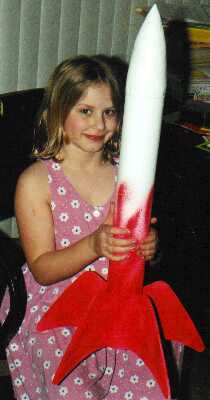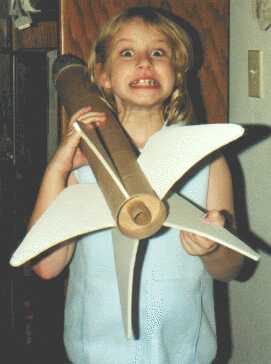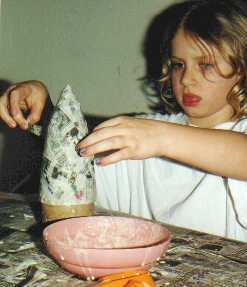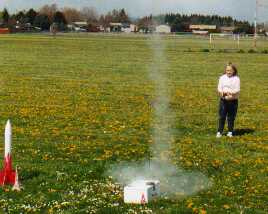| Manufacturer: | Scratch |
(Construction and write-up by Peter, her dad)
 Amanda has three previous rockets, but all of them are pretty small.
In the fall of 2000 she started asking if it might be possible for her
to build a "really big" rocket. I dug in my box of assorted parts and came
out with a tube that used to be the core of a roll of butcher paper. It's
about the size and thickness of 3" HPR tubing, and was 24" long. I suggested
she sit down with paper and pencil and draw me a picture of what she wanted.
She proceeded to sketch out some of the most amazing fins I've ever seen,
which I thought were angel wings, but which she said were supposed to be
fire. She also drew a blunt, maybe 1:1 ogive nose cone which in several
drawings gradually grew to about the length we finally made. I wanted to
make it a paper cone; she said no way, it had to be curved.
Amanda has three previous rockets, but all of them are pretty small.
In the fall of 2000 she started asking if it might be possible for her
to build a "really big" rocket. I dug in my box of assorted parts and came
out with a tube that used to be the core of a roll of butcher paper. It's
about the size and thickness of 3" HPR tubing, and was 24" long. I suggested
she sit down with paper and pencil and draw me a picture of what she wanted.
She proceeded to sketch out some of the most amazing fins I've ever seen,
which I thought were angel wings, but which she said were supposed to be
fire. She also drew a blunt, maybe 1:1 ogive nose cone which in several
drawings gradually grew to about the length we finally made. I wanted to
make it a paper cone; she said no way, it had to be curved.
 Because
the grain in balsa wood would have created a weak area no matter how we
laid out these fins, they were made from foam-core board instead. For better
alignment more than anything else, I added tabs and slotted them in to
the motor mount tube. For a pattern, click here.
I asked Amanda "three fins or four?" and got the pixie
grin and "Can I have five?" After a moment's thought, she got five.
I had her mark the front and rear extent of the slots, and then I marked
and cut the five slots with an X-acto and angle iron.
Because
the grain in balsa wood would have created a weak area no matter how we
laid out these fins, they were made from foam-core board instead. For better
alignment more than anything else, I added tabs and slotted them in to
the motor mount tube. For a pattern, click here.
I asked Amanda "three fins or four?" and got the pixie
grin and "Can I have five?" After a moment's thought, she got five.
I had her mark the front and rear extent of the slots, and then I marked
and cut the five slots with an X-acto and angle iron.
The motor mount tube was 5" of 1" diameter Fax paper core, and a short
piece of BT-50 which fit snugly inside. I cut two centering rings from
some thin, light paneling board salvaged from a cabinet shop dumpster.
She glued them on the motor mount tube 2-1/2" apart, then glued the motor
mount in place with the cr's at the forward and aft end of the fin slots.
Then she glued the fins into the slots, gluing the tabs to the mmt with
a generous amount of yellow glue. When that was dry, she selected one of
my 1/4" id MicroMaxx body tubes to use for a launch lug and glued it alongside
one fin.
 At
the other end, I cut 2" off of the main tube, sliced it down one side,
and glued it into a "coupler" sized tube to serve as a shoulder for the
nose cone. The nose cone itself was quite the adventure. We went shopping
at Michael's and came home with a foam florists' cone, which was a light,
open-cell styrofoam 4" in diameter and 12" high. I epoxied the shoulder
piece to the base of it, let it cure, and then just set in to whittling
with an X-acto #26 blade and coarse sandpaper. Eventually I had a shape
she liked. Then we mixed flour and water to about the consistency of Elmer's
glue, added some actual Elmer's white glue for good measure, and she dipped
strips of newspaper in this and covered the cone with it to make a papier-mache
surface. She had been doing this in school and proved quite skillful at
it. I helped a little at the shoulder joint to maintain a straight line.
At
the other end, I cut 2" off of the main tube, sliced it down one side,
and glued it into a "coupler" sized tube to serve as a shoulder for the
nose cone. The nose cone itself was quite the adventure. We went shopping
at Michael's and came home with a foam florists' cone, which was a light,
open-cell styrofoam 4" in diameter and 12" high. I epoxied the shoulder
piece to the base of it, let it cure, and then just set in to whittling
with an X-acto #26 blade and coarse sandpaper. Eventually I had a shape
she liked. Then we mixed flour and water to about the consistency of Elmer's
glue, added some actual Elmer's white glue for good measure, and she dipped
strips of newspaper in this and covered the cone with it to make a papier-mache
surface. She had been doing this in school and proved quite skillful at
it. I helped a little at the shoulder joint to maintain a straight line.
Initially we put in about ten feet of nylon shoelace cord for a shock
cord, but she spotted 6 feet of the 1/2" braided elastic I use for midpower,
and wanted that. We mounted it to the inside surfaces of the airframe and
nose cone shoulder with an old-fashioned Estes-type three-panel shock cord
mount and yellow glue. At her insistence, we made a 36" parachute out of
aluminized Space Blanket material.
 Firebutt
flew on Saturday, April 7, 2001. Sadly, my camera ran out of film before
this flight. At 11.9 oz. (336 grams) liftoff weight, it might be better
named Leadbutt, but it put in an acceptable low and slow flight on a D12-3.
Unfortunately, the parachute hung up in the mouth of the body tube and
didn't fully deploy, but it did destabilize the rocket. There was no damage
and all is well with the world. At right: Amanda launches her USA on an
A10, too quick for the camera, while Firebutt and Eyeful wait.
Firebutt
flew on Saturday, April 7, 2001. Sadly, my camera ran out of film before
this flight. At 11.9 oz. (336 grams) liftoff weight, it might be better
named Leadbutt, but it put in an acceptable low and slow flight on a D12-3.
Unfortunately, the parachute hung up in the mouth of the body tube and
didn't fully deploy, but it did destabilize the rocket. There was no damage
and all is well with the world. At right: Amanda launches her USA on an
A10, too quick for the camera, while Firebutt and Eyeful wait.
Firebutt flew again on Sunday, May 6, on the playground of Amanda's school. This flight was perfect, straight up with a full parachute at apogee.
Sponsored Ads
 |
 |











